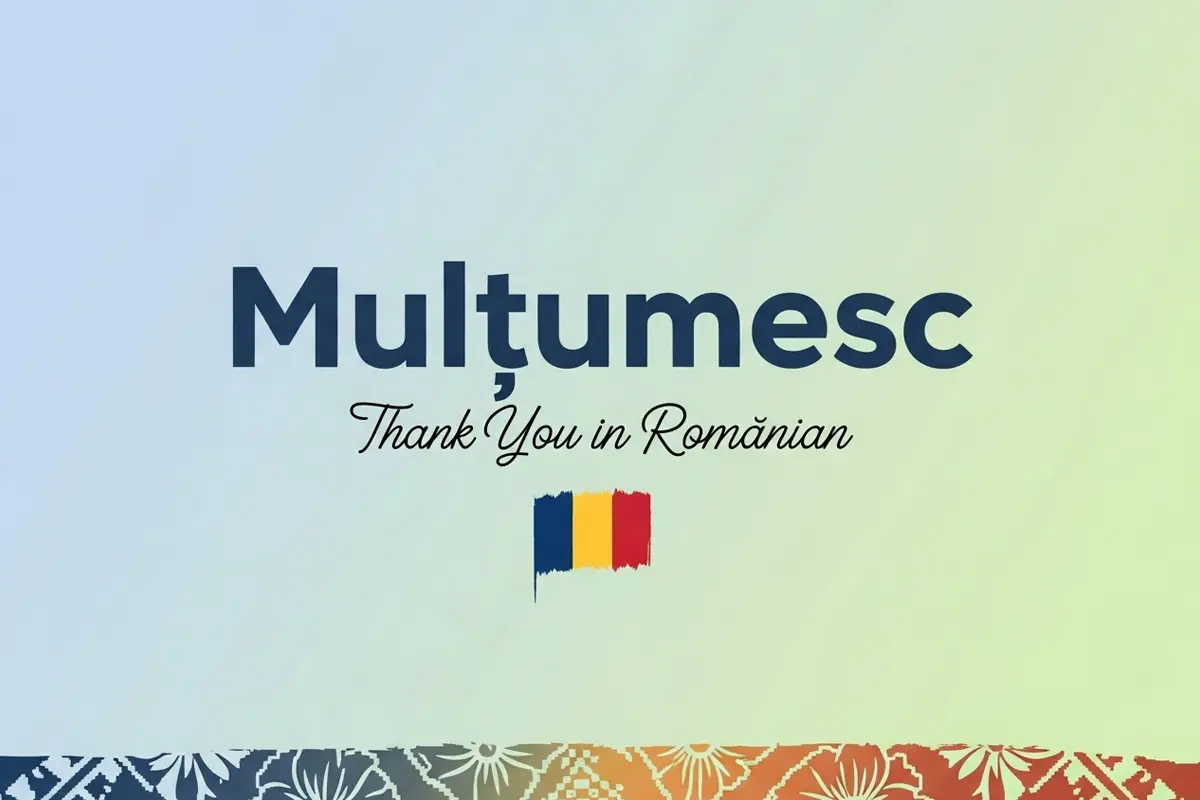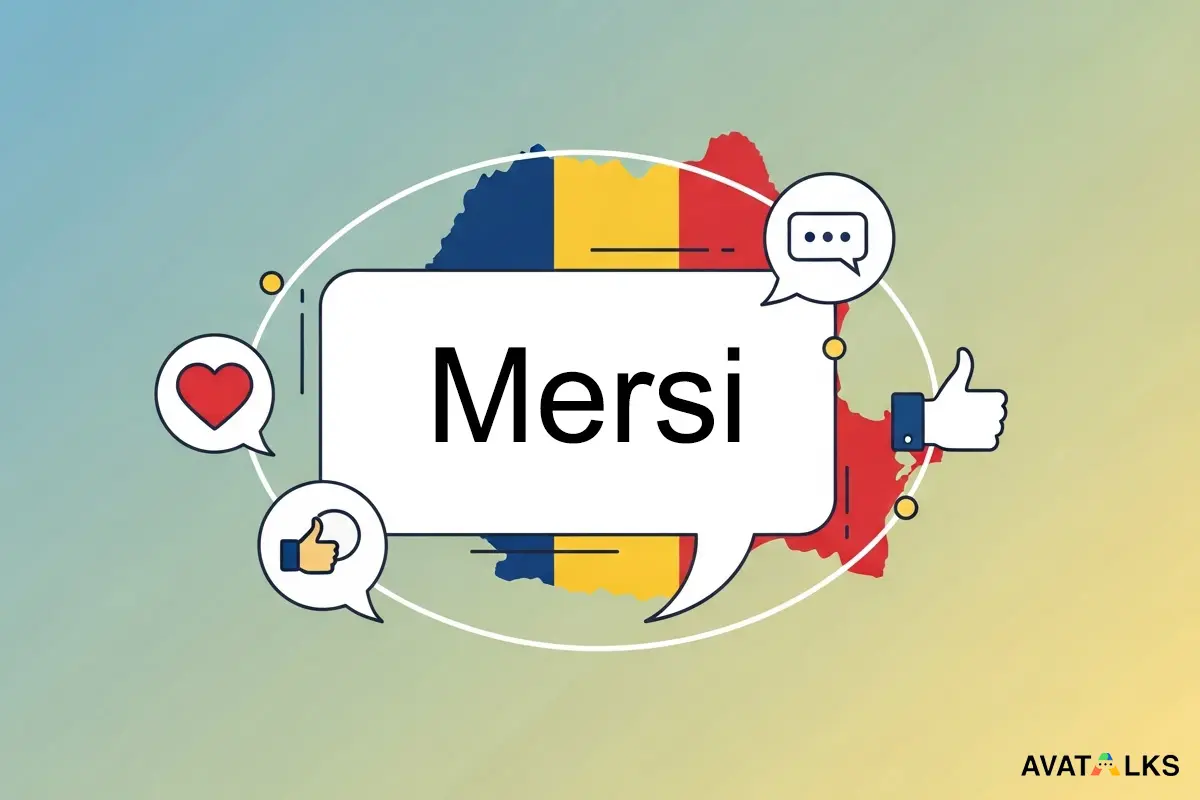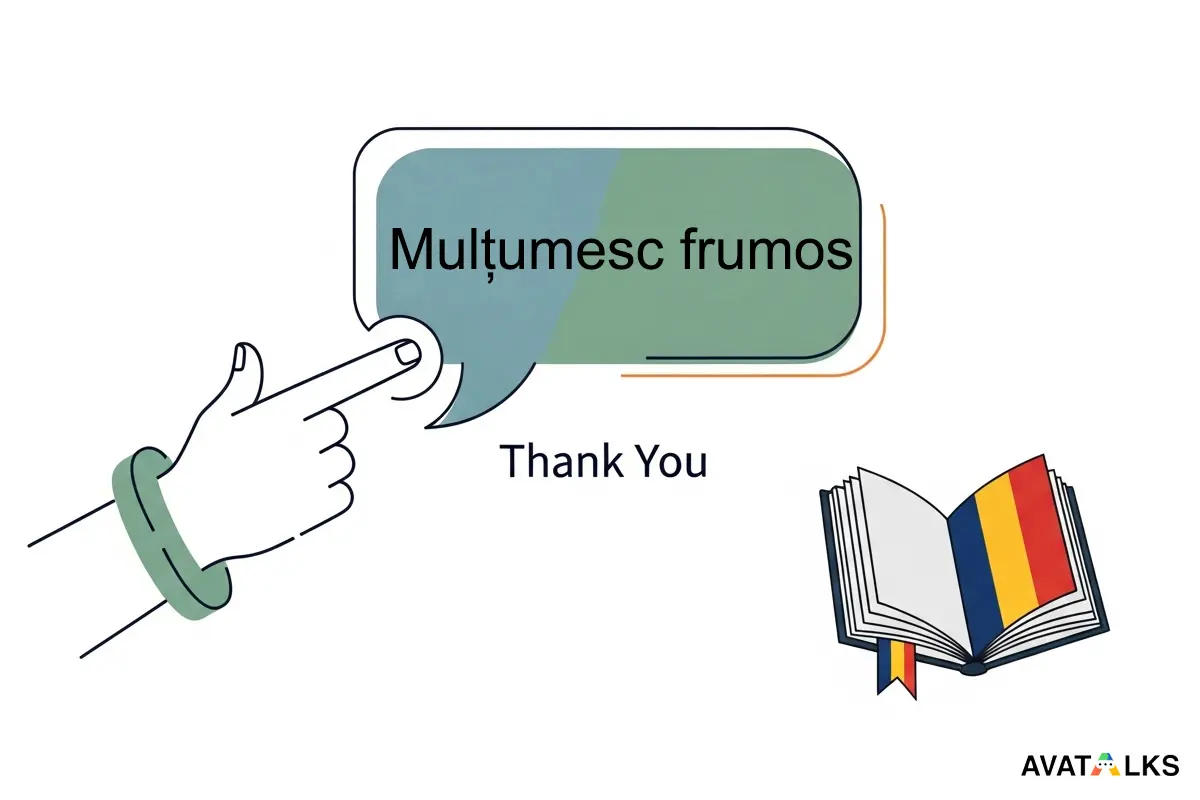
TL;DR
The most important phrase for thank you in Romanian language is:
Mulțumesc (pronounced mool-tsoo-MESK)
You can also use:
- Mersi — Thanks (informal)
- Mulțumesc frumos — Thank you kindly
- Vă mulțumesc — Thank you (formal)
These expressions are used daily in Romania, from casual conversations to professional environments.
Why Learning Thank You in Romanian Language Is Essential
Gratitude is one of the most frequently used social functions in any language. If you plan to travel to Romania, work with Romanian speakers, or learn the language seriously, knowing how to say thank you correctly will immediately improve your communication.
At Avatalks, we’ve observed that learners who practice essential social phrases like “thank you,” “please,” and “hello” early in their learning journey gain speaking confidence faster. These phrases appear constantly in real conversations, which makes them ideal building blocks for natural communication.
Unlike vocabulary lists that learners may forget quickly, expressions like Mulțumesc become part of daily speaking habits when practiced regularly.
If you’re building your Romanian basics, you may also want to review greetings first:
How to Say Hello in Romanian Language
The Core Phrase: Mulțumesc
Mulțumesc is the standard and safest way to say thank you in Romanian.
- Meaning: Thank you
- Pronunciation: mool-tsoo-MESK
- Formality: Neutral (works in all situations)
- Usage: Everyday conversations, professional settings, public interactions
You can use it when:
- Receiving help
- Buying something
- Meeting someone
- Receiving information
- Ending conversations politely
At Avatalks, beginners often repeat this phrase many times during early speaking sessions. Practicing simple phrases like this builds automatic speaking response, which reduces hesitation in real conversations.
Pronunciation Guide: How to Say Mulțumesc Correctly
Romanian pronunciation may feel unfamiliar at first, but Mulțumesc is manageable with practice.
Break it into parts:
- Mul → “mool”
- țu → “tsoo”
- mesc → “mesk”
Important sound tips:
- The letter ț sounds like “ts” in “cats”
- Stress falls on the last syllable: mesc
Consistent pronunciation practice helps learners sound natural quickly. Speaking tools, listening exercises, or AI conversation practice can accelerate this process.
Informal Ways to Say Thank You in Romanian
When speaking with friends, family, or peers, informal expressions are common.
Mersi

Mersi means “Thanks.”
Example:
Mersi pentru ajutor
Thanks for the help
This is widely used in casual situations and especially common among younger speakers.
Romanian adopted this word from French (merci), reflecting historical cultural connections.
Îți mulțumesc
This means “I thank you” in informal speech.
Example:
Îți mulțumesc pentru cadou
Thank you for the gift
Use this when speaking to one person informally.
Formal Ways to Say Thank You in Romanian
Formal speech is important in Romanian workplaces, public services, and professional communication.
Vă mulțumesc

This is the formal version of thank you.
Example:
Vă mulțumesc pentru timpul acordat
Thank you for your time
Use this when speaking to:
- strangers
- managers
- customers
- officials
- elderly people
Many Avatalks learners preparing for job interviews or relocation practice formal expressions extensively because they are essential for professional communication.
Mulțumesc frumos
This phrase adds politeness and warmth.
Example:
Mulțumesc frumos pentru ajutor
Thank you kindly for your help
This works in both polite and semi-formal situations.
Stronger and More Expressive Gratitude
If you want to show deeper appreciation, Romanian offers expressive phrases.
Common examples:
- Mulțumesc foarte mult — Thank you very much
- Mulțumesc din suflet — Thank you from the heart
- Mii de mulțumiri — A thousand thanks
- Mulțumesc pentru tot — Thank you for everything
These phrases are often used in emotional, meaningful, or professional contexts.
How Romanians Respond to Thank You
When someone says thank you, Romanian speakers typically reply with one of these:
- Cu plăcere — You’re welcome
- Cu drag — Gladly
- N-ai pentru ce — No problem
- Pentru puțin — It’s nothing
Example conversation:
You: Mulțumesc
Romanian speaker: Cu plăcere
Practicing full exchanges helps learners develop conversational flow naturally.
Real-Life Situations Where You Use Thank You in Romanian Language
At a Restaurant
Waiter: Poftiți comanda
You: Mulțumesc
In Stores
Cashier: Poftiți restul
You: Mulțumesc frumos
At Work
Colleague: Am trimis raportul
You: Vă mulțumesc
Among Friends
Friend: Ți-am adus cafea
You: Mersi
These real-world examples help learners understand when to use each expression.
Practicing with simulated conversations can improve speaking confidence significantly. You can explore interactive speaking practice here:
Learn more in our guide to AI language learning
Romanian Cultural Insight: Gratitude Is Expected

Romanian culture values politeness and respect. Saying thank you is expected in daily interactions.
Common situations where Romanians express gratitude:
- Receiving food
- Getting help
- Leaving stores
- Receiving services
- Professional communication
Hospitality is especially important. If someone invites you into their home, expressing gratitude sincerely is expected and appreciated.
Beginner, Intermediate, and Advanced Learning Progression
Beginner
Start with:
- Mulțumesc
- Mersi
- Cu plăcere
Practice daily.
Intermediate
Add:
- Mulțumesc frumos
- Vă mulțumesc
- Mulțumesc foarte mult
Use formal and informal forms correctly.
Advanced
Use:
- Mulțumesc din suflet
- Vă mulțumesc pentru oportunitate
- Mulțumesc pentru sprijin
These sound fluent and natural.
Common Mistakes Learners Make
Avoid these mistakes:
Using Mersi in formal situations
Instead use Vă mulțumesc
Not saying thank you verbally
Romanian culture expects verbal gratitude
Incorrect pronunciation of ț
Practice the “ts” sound clearly
Writing Thank You in Romanian Emails
Professional email examples:
Vă mulțumesc pentru mesaj
Thank you for your message
Vă mulțumesc pentru oportunitate
Thank you for the opportunity
Mulțumesc pentru sprijin
Thank you for the support
These are essential for workplace communication.
FAQ: Thank You in Romanian Language
What is the most common thank you in Romanian language?
Mulțumesc
Is Mersi polite?
Yes, but informal
What is the formal thank you?
Vă mulțumesc
How do you say thank you very much?
Mulțumesc foarte mult
What is the reply to thank you?
Cu plăcere
Final Thoughts
Learning how to say thank you in Romanian language is one of the fastest ways to improve your real-world communication.
Start with Mulțumesc, then expand into formal and informal variations as your skills improve.
Consistent speaking practice is key. Many learners build confidence quickly by repeating essential phrases in realistic conversations until they become automatic.
Mastering gratitude expressions helps you sound polite, natural, and confident when speaking Romanian.
References
-
Romanian Academy — Official language authority and linguistic standards
Romanian Academy official website -
Wikipedia — Overview of Romanian language history, pronunciation, and grammar
Romanian language overview (Wikipedia) -
European Commission — Language education policies and multilingualism in Europe
European Commission language education portal